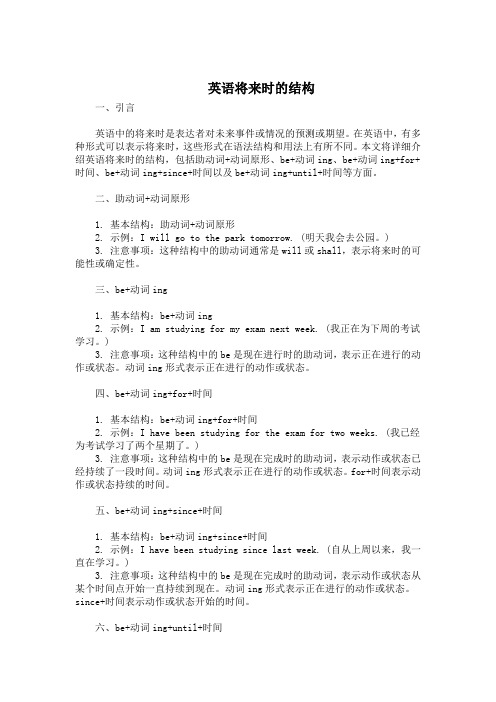语法将来时间表示法
将来时态的常见表达方式例词

将来时态的常见表达方式例词将来时态是英语语法中的一种时态,用于表示将来发生的动作或事件。
在英语中,有多种方式可以表达将来时态。
下面是一些常见的将来时态表达方式及相应的例词。
1. 将来进行时 (Future Continuous)将来进行时用于表示在将来某个时间正在进行的动作或事件。
例词:Tomorrow at this time, I will be studying for my exam.2. 将来完成时 (Future Perfect)将来完成时用于表示将来某个时间已经完成的动作或事件。
例词:By the end of next year, she will have visited five different countries.3. 将来完成进行时 (Future Perfect Continuous)将来完成进行时用于表示将来某个时间开始并持续到这一时间的动作或事件。
例词:By the time you arrive, I will have been waiting for two hours.4. 使用情态动词 (Using Modal Verbs)情态动词可以用于表示将来时,常见的情态动词有will,shall,can,may等。
例词:She will go to the party tonight.5. 使用going to结构 (Using "going to" structure)"going to"结构用于表示根据现有证据或计划将要发生的动作或事件。
例词:I am going to buy a new car next month.6. 使用现在时态 (Using Present Tense)有时,将来时态可以用现在时态来表示,特别是当时间表或日程已经确定。
例词:The train leaves at 7:30 tomorrow morning.7. 使用时间状语从句 (Using Time Clauses)时间状语从句可以用于表示将来时态,常见的引导词有when,after,before等。
将来时态的各种表达方式

将来时态的各种表达方式将来时态是英语语法中一种表示将来事件或状态的时态,它用于描述将来会发生的事情或预测未来的情况。
在英语中,我们可以使用多种方式来表达将来时态。
本文将介绍几种常见的将来时态表达方式。
一、will/shall + 动词原形这是最常用的表达将来时态的方式之一。
will用于第一人称和第三人称,shall用于第二人称和第一人称(在正式的英式英语中)。
例如:1. She will go to the party tomorrow.(她明天会去参加聚会。
)2. They shall arrive at the airport next week.(他们下周将到达机场。
)二、be going to + 动词原形使用be going to表达将来时态时,通常表示预测、计划或意图。
它强调已经计划好或决定好的事情。
例如:1. I am going to visit my grandparents next month.(我下个月要去看望我的祖父母。
)2. They are going to have a meeting tomorrow.(他们明天要开会。
)三、be about to + 动词原形be about to表示即将发生的动作,常用于表示临近的将来,比如即将发生的事情或打算要做的事情。
例如:1. The movie is about to start.(电影就要开始了。
)2. She is about to finish her homework.(她即将完成她的作业。
)四、be to + 动词原形be to表示按计划或安排将要发生的动作,常用于描述预定或安排好的事件。
例如:1. The concert is to be held next week.(音乐会将于下周举行。
)2. The guests are to arrive at 8 o'clock.(客人将在8点到达。
)五、现在进行时尽管现在进行时通常用于描述当前进行的动作,但在一些情况下,它也可以用来表示按计划或安排即将发生的动作。
高中英语 三种将来时间表示法的比较

二、用法拓展
1. 表示与生日,日历,课时安排或交通时刻表有关的动作(一种规律) ,用一般现在 时表示将来时态。
常用于转移动词如:begin, come , leave, go, arrive, start, stop, return, open, close… The evening class begins at 19:00. 晚课7点开始。 The train starts at two. 火车两点出发.
1.现在进行时表示此时此刻正在进行的动作。如句 1、2 。 2.现在进行时有时可以表示按计划或安排即将发生的动作,这种现在进行时 比较生动,给人一种期待感。如句 3、4 。
语法精讲
一、现在进行时表示将来 现在进行时可以表示将来,常含有“意图”“安排”或“打算”的含义,这种用法可以使
句子更加生动,给人一种期待感。具体用法如下: 1.常表示最近或较近的将来,所用动词多是表示位置转移的动词,但偶尔也表示 较远的将来。
2.be going to do用来表示近期或事先考虑要做的事情,以及有迹象表明将要发生的事。 Look at those black clouds;there’s going to be a storm. 瞧那些乌云,眼看要有暴风雨了。
3.be to do表示预定、按计划或安排将要发生的动作。 The meeting is to take place early tomorrow. 会议明天一早召开。
I’m meeting you after class.下课后我找你。 2.表示将来的现在进行时有时含有“决心”的意思,多用在否定结构中,有时也用 在肯定结构中。
I’m not waiting any longer.我不再等了。
3.现在进行时也可在时间、条件或原因状语从句中表示将来。 When you are passing by my front door,please drop in. 你什么时候路过我家,请进来坐。(时间状语从句)
初中英语语法一般将来时

一般将来时一.一般将来时的定义:表示将来某一个时间将要发生的动作或存在的状态,表示将来经常或重复发生的动作。
二.一般将来时的标志:tomorrow(明天),the day after tomorrow(后天)next year(明年)next month(T—个月)next week(下一个星期)3.一般将来时的构成:1.主语^be(am,is,are)going to+动词原形+..例如:(1).I am going to play football tomorrow.明天我将要踢足球.(2).She is going to watch a movie the day after tomorrow.后天她要看一场电影.2.主语+will/shall+动词原形+.....说明:(l).will/shall有时可以和be going to互换;(2) .will是万能的,shall只能用在第一人称,主语是I,we.(3) .will和shall的后而接动词原形)例如shall/will go to Beijing next month.。
will=I11)下个月我将要去北京.(2) .You will come to see me tomorrow.(you will=you'll)明天你将要来看我.(3) .She will read English tomorrow moming.(She will=She'll)明天早上她将要读英语.四.句一般将来时的式:1.肯定句:(1) ..主语+be(am,is,are)going to+动词原形+......(2) ..主语+will/shall+动词原形+.....例句和上面一样,就不举了.2.否定句:(1)..主语+be(am,is,are)not going to+动词原形+......例如:(A):I am not going to play basketball tomorrow.明天我不将踢足球.(B).She is not/isn't going to visit Shanghai next year.明年她不将参观上海.(2)..主语+will/shall not+动词原形+.....(A).I shall not go to school the day after tomorrow o后天我不将上学了(B).I will not write my homework this evening.(will notl=I won't)今晚我不将写作业(C).She will not see a movie next week.(will not=won't)下个星期她将不看一场电影.3.一般疑问句:(A).Am/Is,Are+主语+going to+动词原形+....例如(A).—Am I going to see my grandfather tomorrow?明天我将去看我的爷爷吗?—Yes,you are.是的,你将去.(B).— Are you going to listening to the tape tomorrow?明天你将听录音带吗?—No,I am not.不,我不将.(C). —Is she going to Beijing next year? 明年我将去北京吗?-Yes,she is.是的,她将.(2).Will//shall+主语+动词原形+…例如(A). —Shall we play volleyball next class?下一节课我们将打排球吗?-Yes,you will,是的,你们将.(B). —Will you come here next week?下个星期你将来这儿吗?-Yes,I will.是的,我将.(C).--Will she teach us this term?这学期,她将教我们吗?—Yes,she will.是的,她将.4.特殊疑问句:(1).What(Where,How...)+be(am,is,are)+主语+going to+动词原形+...?例如:(A).—What are you going to do tomorrow? 明天你将要做什么?—rm going to the park? 我将要去动物园.(B).--Where are you going to swim? 你将要去哪儿游泳?—I'm going to swim in the river.(2). What(When,Where,How...)+主语+动词原形+...?例如:(A).---What will you do next week?下个星期你将要做什么?--1 will do my homeworko 我将要做作业.(B).—How will she come here tomorrow?明天她将要怎么来这儿?—She will come here by bus 。
英语将来时的结构

英语将来时的结构一、引言英语中的将来时是表达者对未来事件或情况的预测或期望。
在英语中,有多种形式可以表示将来时,这些形式在语法结构和用法上有所不同。
本文将详细介绍英语将来时的结构,包括助动词+动词原形、be+动词ing、be+动词ing+for+时间、be+动词ing+since+时间以及be+动词ing+until+时间等方面。
二、助动词+动词原形1. 基本结构:助动词+动词原形2. 示例:I will go to the park tomorrow. (明天我会去公园。
)3. 注意事项:这种结构中的助动词通常是will或shall,表示将来时的可能性或确定性。
三、be+动词ing1. 基本结构:be+动词ing2. 示例:I am studying for my exam next week. (我正在为下周的考试学习。
)3. 注意事项:这种结构中的be是现在进行时的助动词,表示正在进行的动作或状态。
动词ing形式表示正在进行的动作或状态。
四、be+动词ing+for+时间1. 基本结构:be+动词ing+for+时间2. 示例:I have been studying for the exam for two weeks. (我已经为考试学习了两个星期了。
)3. 注意事项:这种结构中的be是现在完成时的助动词,表示动作或状态已经持续了一段时间。
动词ing形式表示正在进行的动作或状态。
for+时间表示动作或状态持续的时间。
五、be+动词ing+since+时间1. 基本结构:be+动词ing+since+时间2. 示例:I have been studying since last week. (自从上周以来,我一直在学习。
)3. 注意事项:这种结构中的be是现在完成时的助动词,表示动作或状态从某个时间点开始一直持续到现在。
动词ing形式表示正在进行的动作或状态。
since+时间表示动作或状态开始的时间。
将来时

初中英语一般将来时专项语法讲解一般将来时表示将来某个时间要发生的动作,事情或存在的状态,也表示将来经常或反复发生的动作或事情。
1)will/shall+动词原形shall用于第一人称,常被will 所代替。
will 在陈述句中用于各人称,在征求意见时常用于第二人称。
will not=won't shall not=shan't例如:Which paragraph shall I read first?我先读哪一段呢?Will you be at home at seven this evening? 今晚七点回家好吗?2)be going to +不定式,表示将来。
a. 主语的意图,即将做某事。
例如:What are you going to do tomorrow? 明天打算作什么呢?b. 计划,安排要发生的事。
例如:The play is going to be produced next month。
这出戏下月开播。
c. 有迹象要发生的事。
例如:Look at the dark clouds, there is going to be a storm. 看那乌云,快要下雨了。
3)be +不定式表将来,按计划或正式安排将发生的事。
例如:We are to discuss the report next Saturday.我们下星期六讨论这份报告。
4)be about to +不定式,意为马上做某事。
例如:He is about to leave for Beijing. 他马上要去北京。
注意:be about to do 不能与tomorrow, next week 等表示明确将来时的时间状语连用。
Notice:be to和be going tobe to 表示客观安排或受人指示而做某事,be going to 表示主观的打算或计划。
例如:I am to play football tomorrow afternoon. 明天下午我去踢球。
“一般将来时”的几种语法形式[整理版]
![“一般将来时”的几种语法形式[整理版]](https://img.taocdn.com/s3/m/6c03bef44bfe04a1b0717fd5360cba1aa8118c39.png)
“一般将来时”的几种语法形式一般将来时的语法形式主要有四种:shall / will +动词原形;be going to +动词原形;现在进行时和一般现在时。
现将这四种形式分述如下:一、shall / will +动词原形1. will可用于所有人称,但shall 仅表示单纯将来时,用于第一人称I和we,作为will的一种替代形式。
以Y ou and I为主语时通常避免用shall。
例如:He will be back soon. 他很快就会回来。
I shall/will be free on Sunday. 星期天我有空。
Y ou and I will work in the same factory. 你和我将在同一工厂工作。
2. will, shall可用来预言将来发生的事。
如说出我们设想会发生的事,或者请对方预言将要发生什么事。
例如:It will rain tomorrow. 明天将要下雨。
3. will, shall除可表示单纯的将来时以外,还可以带有意愿的色彩,仍指的是将来。
例如:I’ll buy you a bicycle for your birthday. 你过生日时,我给你买一辆自行车。
(表示允诺) Will you open the door for me please? 请你帮我开门好吗?(表示请求)Shall I get your coat for you? 我可以为你拿外套吗?(表示提议)二、be going to +动词原形1. 表示说话人根据现在已有的迹象,判断将要或即将发生某种情况。
这类句子的主语可以是人,也可是物。
例如:There is going to be a football match in our school tomorrow afternoon. 明天下午我们学校将有一场足球赛。
(已有告示)I feel terrible. I think I’m going to die. 我感到难受极了,我想我快不行了。
韩语 语法将来时中的时制词尾

韩语语法将来时中的时制词尾。
1)韩语中将来时的表示方式:在谓词的(或体词谓词形)末尾加上时制词尾“겠”,表示将来时。
2)韩语将来时的基本意义:韩语将来时主要表示未来的事。
此外,在表示未来的同时,有时还兼有意图、推测等意思。
①表示预定将要发生的事。
如:내일떠나겠으니오늘밤엔더놀자.明天就要离开,今天晚上再玩一会儿吧。
②兼表意图,用于第一人称的陈述句和第二人称的疑问句里。
如:제가말하겠습니다. 我来说。
한가지부탁이있는데해주겠습니까?有件事拜托你,你肯给我办一下吗?还可表示强烈的意志。
如:우리는꼭기한전에이임무를완수하고야말겠습니다.我们一定要提前完成这一任务。
나는앞으로어떤곤난이있어도굴복하지않겠다.不管将来有什么困难,我决不屈服。
这种用法决不能用于第三人称作主语的句子中。
但是当主语后面的部分是间接引语时,主语也可以是第三人称。
김선생도하겠다고하더라.金先生也说要干。
③兼表对现在或未来的某事的推测。
这时有下列几种情况:(1)终结词尾是表示感叹的“구나,군,구만”,或是表示征询对方同意的“지,지요”,这时的“겠”表示一般的推测,说话者倾向于肯定所说的事实。
如:이번경기에는그도참가하겠구만.这次比赛,他也可能参加哩。
오늘은휴일이니까그선생도집에있겠지.今天是休息日,他也可能在家吧。
(2)用在形容词末尾,终结词尾是一般的陈述式或疑问式词尾,这时“겠”表示估计在某种情况下一定会产生某种状态(多为心理状态)。
如:선생님이오시면모두들얼마나반갑겠니?如果老师来了,大家会多高兴啊?(3)用在形容词(或体词谓词形)末尾,终结词尾是一般的陈述式或疑问式词尾,“겠”表示一般的推测。
这时能与“ㄹ(을)것이다”通用,而且常用的是“ㄹ(을)것이다”。
如:저녁의회의가길겠다.(=길것이다)晚上的会可能很长。
(4)用于动词末尾,终结词尾是一般的陈述式词尾,这时“겠”表示:a.提醒对方注意可能发生某件事(甚至是不利的事),让对方采取相应的措施。
- 1、下载文档前请自行甄别文档内容的完整性,平台不提供额外的编辑、内容补充、找答案等附加服务。
- 2、"仅部分预览"的文档,不可在线预览部分如存在完整性等问题,可反馈申请退款(可完整预览的文档不适用该条件!)。
- 3、如文档侵犯您的权益,请联系客服反馈,我们会尽快为您处理(人工客服工作时间:9:00-18:30)。
Simple Present for Future Events: Function The simple present is used to make statements about events at a time later than now, when the statements are based on present facts, and when these facts are something fixed like a time-table, schedule, calendar.
过去将来时间表示法
• • • • • • • 1)would +do 2)would be doing/have been doing 3)was were going to + do 4)was/were to + do 5)was/were doing 6)一般过去式 7)was/were about to + do
The example sentences below correspond to the ideas above:
• • • • • • • • There will be snow in many areas tomorrow. I'm meeting Jim at the airport. We're going to spend the summer abroad. The plane takes off at 3 a.m. I think it's going to rain! We'll give you a lift to the cinema. This time next week I'll be sun-bathing. h. You'll be seeing John in the office tomorrow, won't you? • You are to travel directly to London. • The train is about to leave. • A month from now he will have finished all his exams.
1. will/shall+不定式
• 往往夹杂着情态意义,即常带有说话人的 主观态度和看法 • 1)表示预见(Prediction) • The next train to Beijing will leave at 8 a.m. • You will feel better after taking this medicine. • We shall know the result next week. • Do you think it will rain tomorrow?
2. Future: Present Continuous for the Future: Function The present continuous is used to talk about arrangements for events at a time later than now. There is a suggestion that more than one person is aware of the event, and that some preparation has already happened. e.g. I'm meeting Jim at the airport = and both Jim and I have discussed this. I am leaving tomorrow. = and I've already bought my train ticket. We're having a staff meeting next Monday = and all members of staff have been told about it. More examples Is she seeing him tomorrow? He isn't working next week. They aren't leaving until the end of next year. We are staying with friends when we get to Boston. Note: in example (a), seeing is used in a continuous form because it means meeting.
• 3) 在疑问句中will/shall还可用来征询听话人 的“意图” • Will you be at home at seven this morning? • What shall I do with your mail? • When shall we see you next?
2. will/shall+不定式进行体/完成体
Be going to-v
• 1. 意图 • 2.预见
• Simple future, function • The simple future refers to a time later than now, and expresses facts or certainty. In this case there is no 'attitude'. • The simple future is used: • to predict a future event: It will rain tomorrow. • (with I/we) to express a spontaneous decision: I'll pay for the tickets by credit card. • to express willingness: I'll do the washing-up. He'll carry your bag for you. • (in the negative form) to express unwillingness: The baby won't eat his soup. I won't leave until I've seen the manager! • (with I in the interrogative form) to make an offer: Shall I open the window? • (with we in the interrogative form) to make a suggestion: Shall we go to the cinema tonight? • (with I in the interrogative form) to ask for advice or instructions: What shall I tell the boss about this money? • (with you) to give orders: You will do exactly as I say. • (with you) to give an invitation: Will you come to the dance with me? Wiroduction
• There are a number of different ways of referring to the future in English. It is important to remember that we are expressing more than simply the time of the action or event. Obviously, any 'future' tense will always refer to a time 'later than now', but it may also express our attitude to the future event.
第13讲
将来时间表示法
• • • •
一般将来时 will do 将来进行体 will be doing 将来完成体 will have done 将来完成进行体 will have been doing
表示将来时间的多种结构
• 1) will/shall + do • 2)will/shall+be doing/have done/have been doing • 3)be going to +do • 4)be +doing(现在进行体) • 5)be to +do • 6)一般现在时
• 2) 意愿(Willingness)或意图(Intention) • I will do it, if you like. • I promise to pay him back in time, but he won’t lend it to me. • I’ll go and see Tom as soon as I get to Shanghai.
• 2)“will/shall+不定式进行体”结构也可以表 示将来某一时刻或时段里正在进行的动作。 • I will be working in Geneva during May. • What will you be doing this time tomorrow?
• “Will/shall+不定式完成体”表示将来某一时 刻之前已完成的动作 • I’ll have finished my work by five this afternoon. • Before long he will have forgotten all about it.
All of the following ideas can be expressed using different tenses:
